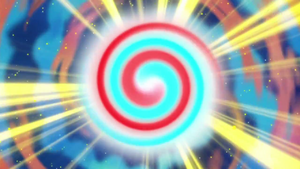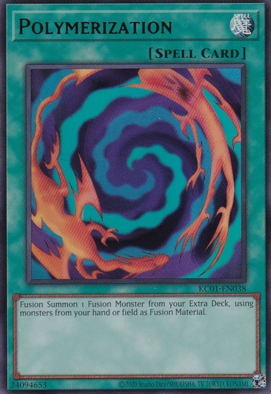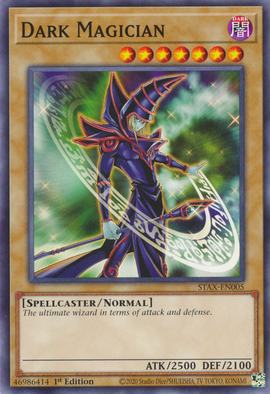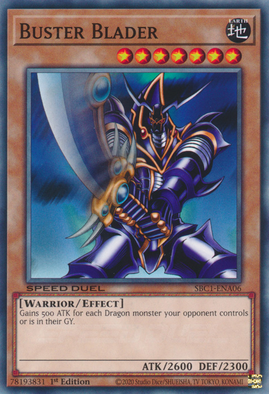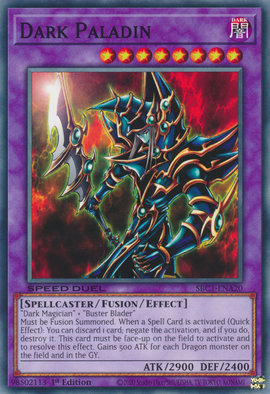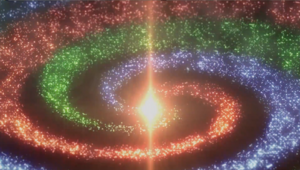Difference between revisions of "Fusion Summon"
(→How to Fusion Summon) |
TrueKringe (talk | contribs) (→Yu-Gi-Oh! Master Duel) |
||
| (34 intermediate revisions by 15 users not shown) | |||
| Line 1: | Line 1: | ||
| − | |||
{{Infobox/Archetype/Start | {{Infobox/Archetype/Start | ||
| image name = FusionSummon-AV.png | | image name = FusionSummon-AV.png | ||
| image size = | | image size = | ||
| − | | image caption = A Fusion Summon in Yu-Gi-Oh ARC-V | + | | image caption = A Fusion Summon in ''Yu-Gi-Oh ARC-V'' |
}} | }} | ||
{{Infobox/Archetype/ExtendedName | {{Infobox/Archetype/ExtendedName | ||
| Line 12: | Line 11: | ||
| japanese translated = | | japanese translated = | ||
| english = Fusion Summon | | english = Fusion Summon | ||
| − | | french = Invocation Fusion<br>Verb: Invoquer par Fusion | + | | french = Invocation Fusion<br />Verb: Invoquer par Fusion |
| − | | german = Fusionsbeschwörung<br>Verb: beschwören als Fusionsbeschwörung | + | | german = Fusionsbeschwörung<br />Verb: beschwören als Fusionsbeschwörung |
| − | | italian = Evocazione | + | | italian = Evocazione tramite Fusione<br />Verb: Evocare tramite Fusione |
| korean = 융합 소환 (融合召喚) ''Yunghap Sohwan'' | | korean = 융합 소환 (融合召喚) ''Yunghap Sohwan'' | ||
| − | |chinese=融合召喚 ''Rónghé Zhàohuàn / Jung4 hap6 Ziu6 wun6'' | + | | chinese = 融合召喚 ''Rónghé Zhàohuàn / Jung4 hap6 Ziu6 wun6'' |
| − | | portuguese = Invocação-Fusão<br>Verb: Invocar por Invocação-Fusão | + | | portuguese = Invocação-Fusão<br />Verb: Invocar por Invocação-Fusão |
| − | | spanish = Invocación por Fusión<br>Verb: Invocar por Fusión | + | | spanish = Invocación por Fusión<br />Verb: Invocar por Fusión |
| + | | simplified chinese = 融合召唤 ''Rónghé Zhàohuàn'' | ||
}} | }} | ||
{{Infobox/Archetype/End}} | {{Infobox/Archetype/End}} | ||
| − | A '''Fusion Summon''' ({{Ruby|融|ゆう}}{{Ruby|合|ごう}}{{Ruby|召|しょう}}{{Ruby|喚|かん}} ''Yūgō Shōkan'') is the | + | A '''Fusion Summon''' (Japanese OCG: {{Ruby|融|ゆう}}{{Ruby|合|ごう}}{{Ruby|召|しょう}}{{Ruby|喚|かん}} ''Yūgō Shōkan''; Japanese [[Rush Duel]]: フュージョン{{Ruby|召|しょう}}{{Ruby|喚|かん}} ''Fyūjon Shōkan'') is the standard method for [[Special Summon]]ing a [[Fusion Monster]] from the [[Extra Deck]]. It requires a card effect to combine 2 or more monsters as [[Fusion Material]]. |
| − | == | + | ==Mechanics== |
| − | A | + | A Fusion Summon can only be performed by a [[effect|card effect]]. Card effects that Fusion Summon first require the player to "use" appropriate monsters as [[Fusion Material]]s listed on a Fusion Monster by moving them from some location(s) to another, then after that Fusion Summon the Fusion Monster from the [[Extra Deck]] [[face-up]] to an unoccupied [[Main Monster Zone|Main]] or [[Extra Monster Zone]]. |
| − | + | Most commonly, [[Performs a Fusion Summon|cards with effects that can Fusion Summon]] are [[Spell Card]]s (e.g. "[[Polymerization]]"). These effects typically involve using monsters from the player's hand or field as Fusion Materials. If not otherwise specified in the card text, monsters used as Fusion Material are [[sent]] to the [[Graveyard]]. | |
| − | + | When an effect to Fusion Summon resolves, if the required Fusion Materials cannot be used or the Fusion Monster cannot be Fusion Summoned, no Fusion Summon occurs, nor are any Fusion Materials moved. For example, if the activating player cannot Special Summon when "Polymerization" resolves, no monsters are sent to the Graveyard as Fusion Material. | |
| − | {{-}} | + | Even if all of a player's Monster Zones are occupied, a Fusion Monster can still be Fusion Summoned as long as at least one of the monsters in these zones is used as Fusion Material, so that there is an available zone when the Fusion Monster is Summoned. Otherwise, if there is no room to Fusion Summon a monster when a Fusion Summoning effect resolves, the Fusion Summon is not performed. |
| + | |||
| + | [[Face-down]] monsters on the field can be used as Fusion Materials, as long as they are controlled by the player performing the Fusion Summon and the card performing the Summon allows it.<ref name="Perfect Rulebook p72">{{cite book |author=Konami |title=Yu-Gi-Oh! Official Card Game - Perfect Rulebook 2015 |url=https://ygorganization.com/perfectrulebook/ |page=72}}</ref> | ||
| + | |||
| + | ===Fusion Summoning effect variations=== | ||
| + | As Fusion Summons are always performed by card effects, the specific actions involved in Fusion Summoning are exclusively determined by the individual effects that do so, meaning that their details can vary significantly. | ||
| + | |||
| + | * Cards of all card types can have Fusion Summoning effects. For example, "[[D/D Swirl Slime]]" ([[Monster Card]]), "[[Polymerization]]" ([[Spell Card]]), "[[Necro Fusion]]" ([[Trap Card]]). | ||
| + | |||
| + | * Fusion Summoning effects can use monsters from various locations as Fusion Materials, sometimes moving materials to different locations based on their original location. Examples: | ||
| + | ** "[[Super Polymerization]]" (uses monsters from either player's field as material) | ||
| + | ** "[[Miracle Fusion]]" (banishes monsters from the field or Graveyard as material) | ||
| + | ** "[[Cyberdark Impact!]]" (shuffles monsters from the hand, field, or Graveyard into the Deck as material) | ||
| + | ** "[[Parallel World Fusion]]" (shuffles banished monsters into the Deck as material) | ||
| + | ** "[[Brilliant Fusion]]" (uses monsters in the Deck as material) | ||
| + | ** "[[Odd-Eyes Fusion]]" (uses monsters in the [[Extra Deck]] as material) | ||
| + | ** "[[Ghost Fusion]]" (uses monsters from the field as material, but can also banish a monster from the hand, Deck, or Graveyard as material) | ||
| + | |||
| + | * While normally only monsters (including Spell/Trap Cards treated as monsters) can be used as Fusion Materials, some card effects allow Monster Cards treated as Spell/Trap Cards to be used as Fusion Materials. Examples: | ||
| + | ** "[[Magistus Invocation]]" (can use Monster Cards treated as [[Equip Card]]s as material) | ||
| + | ** "[[Pendulum Fusion]]" (can use [[Pendulum Monster]]s in the [[Pendulum Zone]]s as material) | ||
| + | ** "[[Vision Fusion]]" (can use Monster Cards treated as [[Continuous Trap]]s as material) | ||
| + | |||
| + | * Fusion Summoning effects can perform particular actions on materials beyond simply moving them. Examples: | ||
| + | ** "[[Rapid Trigger]]" (Fusion Summons by destroying Fusion Materials) | ||
| + | ** "[[Dark World Accession]]" (Fusion Summons by discarding Fusion Materials) | ||
| + | |||
| + | * Fusion Summoning effects can entirely ignore the material requirements of the Fusion Monster being Fusion Summoned. The sole example of such an effect is "[[The Eye of Timaeus]]", which Fusion Summons specifically using only 1 "[[Dark Magician (archetype)|Dark Magician]]" monster, even though all of its applicable targets require at least 2 monsters as materials.<ref>[https://www.db.yugioh-card.com/yugiohdb/faq_search.action?ope=5&fid=88&request_locale=ja Konami OCG Card Database: Ruling #88]</ref> | ||
| + | |||
| + | ===Interactions with effects=== | ||
| + | * Some cards have effects that allow the player to use monsters from locations other than the ones specified in the Fusion Summoning effect as materials when Fusion Summoning (e.g. "[[Cybernetic Fusion Support]]", "[[Chain Material]]"). | ||
| + | * [[Fusion Substitute Monster]]s can be used in Fusion Summoning effects in place of a material with specified conditions that the Fusion Substitute Monsters inherently do not fulfill. Usually, they can substitute for a material with a specifically listed name, but "[[Shaddoll Core]]" can substitute for materials of certain [[Attribute]]s instead. | ||
| + | ** Some Fusion Monsters have a condition that they [[Must be Fusion Summoned with listed Fusion Materials|must be Fusion Summoned with their listed Fusion Materials]], which prevents Fusion Substitute Monsters from substituting any of the Fusion Materials. However, this restriction only applies to Fusion Material substitution effects—it does not prevent using monsters whose names have been [[Changes card names|changed]] to or [[Treated as alternate name|treated]] as a different card name from being used as a material according to that name. | ||
| + | |||
| + | ===Treating a Special Summon as a Fusion Summon=== | ||
| + | {{main|Treats Special Summon as Fusion Summon}} | ||
| + | Some card effects can Special Summon a Fusion Monster, treating that Special Summon as a Fusion Summon. This type of Special Summon is not a Fusion Summon despite being treated as one, so it does not necessarily follow any mechanics of a Fusion Summon. | ||
==Example== | ==Example== | ||
| + | {{Show card image gallery | ||
| + | | Polymerization | "[[Polymerization]]" | ||
| + | | Dark Magician | + A [[Fusion Material]]<br />("[[Dark Magician]]") | ||
| + | | Buster Blader | + A [[Fusion Material]]<br />("[[Buster Blader]]") | ||
| + | | Dark Paladin | {{=}} A [[Fusion Monster]]<br />("[[Dark Paladin]]") | ||
| + | }} | ||
| − | == | + | ==Rush Duel== |
| − | + | In ''[[Yu-Gi-Oh! Rush Duel]]'', the main card for Fusion Summoning is "[[Fusion (Rush Duel)|Fusion]]". "Fusion" can only use face-up monsters from the controller's field as Fusion Materials. "[[Polymerization (Rush Duel)|Polymerization]]" and "[[Power Bond (Rush Duel)|Power Bond]]" are also available as [[Legend Card]]s, and other Spells, Traps and monster effects that can perform Fusion Summons have subsequently been added. | |
| − | |||
| − | |||
| − | |||
| − | |||
| − | |||
| − | === | + | ==Appearance== |
| − | + | ===Anime=== | |
| − | + | ====''Yu-Gi-Oh!'', ''GX'', ''5D's'', and ''ZEXAL''==== | |
| − | + | Visual depictions of Fusion Summons have varied significantly among the first four anime series. Typically, the Fusion Materials, or their cards, are shown being warped into particles or forms of energy in a spiral direction, which then merge with each other within a spiraling portal, from which the Fusion Monster emerges. One depiction, notably used for "[[Dark Paladin]]" and "[[Dragon Knight Draco-Equiste]]", shows the Fusion Materials being engulfed in a sphere of energy, which then disperses to reveal the Fusion Monster. Other times, the Fusion Monster emerges from a fierce whirlwind. | |
| − | |||
| − | |||
| − | |||
| − | === | + | ====''Yu-Gi-Oh! ARC-V''==== |
| − | + | In ''[[Yu-Gi-Oh! ARC-V]]'', a standardized animation is adopted for all Fusion Summons: a blue and orange rotating background based on the artwork of "Polymerization", and the Fusion Materials transforming into featureless shapes of different colors (usually contrasting ones like blue and red, yellow and violet, etc.) that swirl together to form a spinning spiral, which then sometimes turns into a bright white light. It is then followed by a close-up shot of the player, usually clasping or clapping their hands together, as if mirroring the materials becoming one. | |
| − | |||
| − | |||
| − | |||
| − | |||
| − | |||
| − | |||
| − | |||
| − | + | In ''Yu-Gi-Oh! ARC-V'', a Fusion Summon performed using Fusion Materials that have been previously [[Pendulum Summon]]ed is referred to as a "Pendulum-Fusion". | |
| − | |||
| − | == | + | ====''Yu-Gi-Oh! VRAINS''==== |
| − | + | [[File:CynetFusion-JP-Anime-VR-NC.png|thumb|right|A Fusion Summon in ''Yu-Gi-Oh! VRAINS'']] | |
| + | In ''[[Yu-Gi-Oh! VRAINS]]'', Fusion Summoning is changed to a different CGI effect, where the Fusion Materials transform into streams of colored particles that swirl together and then burst upwards into vortexes of colors matching the streams, which twist around each another and quickly merge into a large purple one, from where the Fusion Monster appears. | ||
| − | + | ====''Yu-Gi-Oh! SEVENS'' and ''GO RUSH!!''==== | |
| + | In ''[[Yu-Gi-Oh! SEVENS]]'' and ''[[Yu-Gi-Oh! GO RUSH!!]]'', the background is distorted with pink and blue ripples, visually somewhat similar to its appearance in ''Yu-Gi-Oh! ARC-V''. The Duelist raises their [[Duel Disk]] into the air, creating a "7" shape with their arm, and "[[Fusion (Rush Duel)|Fusion]]" creates a "Road" from the Duelist's Duel Disk, then it shows the listed materials fuse by overlaying one over another, creating a large colored beam, the Fusion Monster is generated afterwards. | ||
| − | + | ===Video games=== | |
| + | ====''Yu-Gi-Oh! Duel Links''==== | ||
| + | When most characters perform a Fusion Summon, an animation similar to the animation in the ''Yu-Gi-Oh! ARC-V'' anime is played. When a ''VRAINS'' character, or a [[Standard Duelist]] in Duel World (VRAINS), performs a Fusion Summon, an animation based on the ''VRAINS'' anime animation is played. | ||
| − | + | ====''Yu-Gi-Oh! Master Duel''==== | |
| + | The Fusion Summon animation in ''[[Yu-Gi-Oh! Master Duel]]'' is based on that from the ''Yu-Gi-Oh!'' anime, with the materials being surrounded in a purple aura before they are warped into the "Polymerization" portal in a spiral; the Fusion Monster emerges from the spiral when the Summon is complete. The only exception is when "[[Super Polymerization (Master Duel)|Super Polymerization]]" is used to perform the Fusion Summon, to which the yellow flash portal of "Super Polymerization" appears before the monsters were warped into the "Polymerization" portal. | ||
==See also== | ==See also== | ||
* [[Contact Fusion]] | * [[Contact Fusion]] | ||
| − | + | ||
| − | + | ==Trivia== | |
| − | + | In the ''[[Yu-Gi-Oh! (manga)|Yu-Gi-Oh!]]'' manga and [[Yu-Gi-Oh! (anime)|anime]], under [[Battle City Rules]], which applied during the [[Battle City]] tournament, [[Fusion Monster]]s cannot [[attack]] the same [[turn]] they are Fusion Summoned. This is exemplified in [[Yu-Gi-Oh! - Episode 065|episode 65]], when [[Strings]] uses "[[Quick Attack]]" on "[[Humanoid Worm Drake]]" to bypass that rule in his [[Duel]] against [[Yami Yugi]]. It also applied during the ''[[Yu-Gi-Oh! R]]'' manga and the [[Virtual World (arc)|Virtual World]] arc. This rule does not exist in the ''[[Yu-Gi-Oh! Official Card Game|OCG]]''/''[[Yu-Gi-Oh! Trading Card Game|TCG]]'' and was removed from the anime starting with the ''[[Waking the Dragons]]'' arc and for all subsequent series. | |
| − | + | ||
| − | + | ==References== | |
| − | + | <references /> | |
{{Gameplay}} | {{Gameplay}} | ||
[[Category:Types of Summon]] | [[Category:Types of Summon]] | ||
| − | |||
| − | |||
Latest revision as of 12:31, 27 March 2024
A Fusion Summon (Japanese OCG:
Mechanics[edit]
A Fusion Summon can only be performed by a card effect. Card effects that Fusion Summon first require the player to "use" appropriate monsters as Fusion Materials listed on a Fusion Monster by moving them from some location(s) to another, then after that Fusion Summon the Fusion Monster from the Extra Deck face-up to an unoccupied Main or Extra Monster Zone.
Most commonly, cards with effects that can Fusion Summon are Spell Cards (e.g. "Polymerization"). These effects typically involve using monsters from the player's hand or field as Fusion Materials. If not otherwise specified in the card text, monsters used as Fusion Material are sent to the Graveyard.
When an effect to Fusion Summon resolves, if the required Fusion Materials cannot be used or the Fusion Monster cannot be Fusion Summoned, no Fusion Summon occurs, nor are any Fusion Materials moved. For example, if the activating player cannot Special Summon when "Polymerization" resolves, no monsters are sent to the Graveyard as Fusion Material.
Even if all of a player's Monster Zones are occupied, a Fusion Monster can still be Fusion Summoned as long as at least one of the monsters in these zones is used as Fusion Material, so that there is an available zone when the Fusion Monster is Summoned. Otherwise, if there is no room to Fusion Summon a monster when a Fusion Summoning effect resolves, the Fusion Summon is not performed.
Face-down monsters on the field can be used as Fusion Materials, as long as they are controlled by the player performing the Fusion Summon and the card performing the Summon allows it.[1]
Fusion Summoning effect variations[edit]
As Fusion Summons are always performed by card effects, the specific actions involved in Fusion Summoning are exclusively determined by the individual effects that do so, meaning that their details can vary significantly.
- Cards of all card types can have Fusion Summoning effects. For example, "D/D Swirl Slime" (Monster Card), "Polymerization" (Spell Card), "Necro Fusion" (Trap Card).
- Fusion Summoning effects can use monsters from various locations as Fusion Materials, sometimes moving materials to different locations based on their original location. Examples:
- "Super Polymerization" (uses monsters from either player's field as material)
- "Miracle Fusion" (banishes monsters from the field or Graveyard as material)
- "Cyberdark Impact!" (shuffles monsters from the hand, field, or Graveyard into the Deck as material)
- "Parallel World Fusion" (shuffles banished monsters into the Deck as material)
- "Brilliant Fusion" (uses monsters in the Deck as material)
- "Odd-Eyes Fusion" (uses monsters in the Extra Deck as material)
- "Ghost Fusion" (uses monsters from the field as material, but can also banish a monster from the hand, Deck, or Graveyard as material)
- While normally only monsters (including Spell/Trap Cards treated as monsters) can be used as Fusion Materials, some card effects allow Monster Cards treated as Spell/Trap Cards to be used as Fusion Materials. Examples:
- "Magistus Invocation" (can use Monster Cards treated as Equip Cards as material)
- "Pendulum Fusion" (can use Pendulum Monsters in the Pendulum Zones as material)
- "Vision Fusion" (can use Monster Cards treated as Continuous Traps as material)
- Fusion Summoning effects can perform particular actions on materials beyond simply moving them. Examples:
- "Rapid Trigger" (Fusion Summons by destroying Fusion Materials)
- "Dark World Accession" (Fusion Summons by discarding Fusion Materials)
- Fusion Summoning effects can entirely ignore the material requirements of the Fusion Monster being Fusion Summoned. The sole example of such an effect is "The Eye of Timaeus", which Fusion Summons specifically using only 1 "Dark Magician" monster, even though all of its applicable targets require at least 2 monsters as materials.[2]
Interactions with effects[edit]
- Some cards have effects that allow the player to use monsters from locations other than the ones specified in the Fusion Summoning effect as materials when Fusion Summoning (e.g. "Cybernetic Fusion Support", "Chain Material").
- Fusion Substitute Monsters can be used in Fusion Summoning effects in place of a material with specified conditions that the Fusion Substitute Monsters inherently do not fulfill. Usually, they can substitute for a material with a specifically listed name, but "Shaddoll Core" can substitute for materials of certain Attributes instead.
- Some Fusion Monsters have a condition that they must be Fusion Summoned with their listed Fusion Materials, which prevents Fusion Substitute Monsters from substituting any of the Fusion Materials. However, this restriction only applies to Fusion Material substitution effects—it does not prevent using monsters whose names have been changed to or treated as a different card name from being used as a material according to that name.
Treating a Special Summon as a Fusion Summon[edit]
Some card effects can Special Summon a Fusion Monster, treating that Special Summon as a Fusion Summon. This type of Special Summon is not a Fusion Summon despite being treated as one, so it does not necessarily follow any mechanics of a Fusion Summon.
Example[edit]
+ A Fusion Material
("Dark Magician")+ A Fusion Material
("Buster Blader")= A Fusion Monster
("Dark Paladin")
Rush Duel[edit]
In Yu-Gi-Oh! Rush Duel, the main card for Fusion Summoning is "Fusion". "Fusion" can only use face-up monsters from the controller's field as Fusion Materials. "Polymerization" and "Power Bond" are also available as Legend Cards, and other Spells, Traps and monster effects that can perform Fusion Summons have subsequently been added.
Appearance[edit]
Anime[edit]
Yu-Gi-Oh!, GX, 5D's, and ZEXAL[edit]
Visual depictions of Fusion Summons have varied significantly among the first four anime series. Typically, the Fusion Materials, or their cards, are shown being warped into particles or forms of energy in a spiral direction, which then merge with each other within a spiraling portal, from which the Fusion Monster emerges. One depiction, notably used for "Dark Paladin" and "Dragon Knight Draco-Equiste", shows the Fusion Materials being engulfed in a sphere of energy, which then disperses to reveal the Fusion Monster. Other times, the Fusion Monster emerges from a fierce whirlwind.
Yu-Gi-Oh! ARC-V[edit]
In Yu-Gi-Oh! ARC-V, a standardized animation is adopted for all Fusion Summons: a blue and orange rotating background based on the artwork of "Polymerization", and the Fusion Materials transforming into featureless shapes of different colors (usually contrasting ones like blue and red, yellow and violet, etc.) that swirl together to form a spinning spiral, which then sometimes turns into a bright white light. It is then followed by a close-up shot of the player, usually clasping or clapping their hands together, as if mirroring the materials becoming one.
In Yu-Gi-Oh! ARC-V, a Fusion Summon performed using Fusion Materials that have been previously Pendulum Summoned is referred to as a "Pendulum-Fusion".
Yu-Gi-Oh! VRAINS[edit]
In Yu-Gi-Oh! VRAINS, Fusion Summoning is changed to a different CGI effect, where the Fusion Materials transform into streams of colored particles that swirl together and then burst upwards into vortexes of colors matching the streams, which twist around each another and quickly merge into a large purple one, from where the Fusion Monster appears.
Yu-Gi-Oh! SEVENS and GO RUSH!![edit]
In Yu-Gi-Oh! SEVENS and Yu-Gi-Oh! GO RUSH!!, the background is distorted with pink and blue ripples, visually somewhat similar to its appearance in Yu-Gi-Oh! ARC-V. The Duelist raises their Duel Disk into the air, creating a "7" shape with their arm, and "Fusion" creates a "Road" from the Duelist's Duel Disk, then it shows the listed materials fuse by overlaying one over another, creating a large colored beam, the Fusion Monster is generated afterwards.
Video games[edit]
Yu-Gi-Oh! Duel Links[edit]
When most characters perform a Fusion Summon, an animation similar to the animation in the Yu-Gi-Oh! ARC-V anime is played. When a VRAINS character, or a Standard Duelist in Duel World (VRAINS), performs a Fusion Summon, an animation based on the VRAINS anime animation is played.
Yu-Gi-Oh! Master Duel[edit]
The Fusion Summon animation in Yu-Gi-Oh! Master Duel is based on that from the Yu-Gi-Oh! anime, with the materials being surrounded in a purple aura before they are warped into the "Polymerization" portal in a spiral; the Fusion Monster emerges from the spiral when the Summon is complete. The only exception is when "Super Polymerization" is used to perform the Fusion Summon, to which the yellow flash portal of "Super Polymerization" appears before the monsters were warped into the "Polymerization" portal.
See also[edit]
Trivia[edit]
In the Yu-Gi-Oh! manga and anime, under Battle City Rules, which applied during the Battle City tournament, Fusion Monsters cannot attack the same turn they are Fusion Summoned. This is exemplified in episode 65, when Strings uses "Quick Attack" on "Humanoid Worm Drake" to bypass that rule in his Duel against Yami Yugi. It also applied during the Yu-Gi-Oh! R manga and the Virtual World arc. This rule does not exist in the OCG/TCG and was removed from the anime starting with the Waking the Dragons arc and for all subsequent series.
